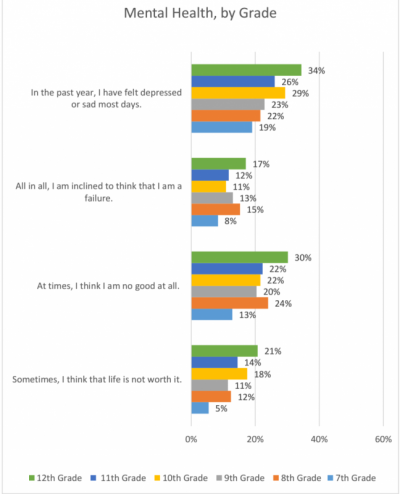Survey indicates student mental health issues
Marion Board of Health members are worried about the mental health of children.
After a presentation from public health consultant Beth Beatriz that presented the data from the Communities That Care survey, members expressed their surprise and worry about some of the depressive symptoms students are showing.
Students in grades 7-12 took the survey in October to help determine risk factors that could lead to risky behavior.
The survey looked at a multitude of areas, including community life, family life, school life, habits of friends and drug and alcohol use. The idea was that the survey would help identify which risk factors are most prominent in the tri-town communities so that they could be addressed.
While most of the data reflected good family lives and low risk behavior, the results for mental health were more concerning to the board.
Beatriz said that while there’s not specifically a clinical depression part of the survey, there are emotional health questions that students responded to in ways that suggested clinical depression. Between the junior high and high school 16 percent of students’ responses suggested clinical depression. Removing seventh graders rom that group bumps the average up to 20 percent.
While these statistics are not necessarily uncommon nationwide, Beatriz said that they are on the higher side.
Beatriz also said there was a co-occurance between depression and drug and alcohol use, though one does not necessarily cause the other.
These statistics are things the board wants parents to be aware of.
“If there is one message that needs to go out, it’s that [parents] should worry about whether their kid might be depressed and putting them at risk of risky behavior,” board member Dr. John Howard said.
Beatriz added that it can sometimes be hard to recognize symptoms of depression in people you care about.
“Sometimes you don’t know that your kid is depressed,” she said. “There are many very high functioning people who are also struggling with depression. It can be any kids…Sometimes its hard to look within ones own family or self and see what’s really there.”
Because of the co-occurance of depression and drug and alcohol use, Howard also saw how depression could lead to a life of addiction. He pointed out that addressing mental health issues early on could stop future addiction problems.
“There’s no good treatment for addiction, so try to prevent it,” he said. “If you don’t educate you’re going to have a problem.”














